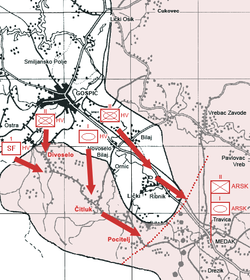
Back مداک پاکت عملیاتی AZB Operace Medacká kapsa Czech Militäroperation Medak German عملیات مداک پاکت Persian Operaatio Medakin motti Finnish Opération de la poche de Medak French Operacija Medački džep Croatian Medaki zseb hadművelet Hungarian Operazione sacca di Medak Italian Operasjon Medak lomme NB
| Operation Medak Pocket | ||||||||
|---|---|---|---|---|---|---|---|---|
| Part of the Croatian War of Independence | ||||||||
 Croatian advance during Operation Medak Pocket | ||||||||
| ||||||||
| Belligerents | ||||||||
|
|
| |||||||
| Commanders and leaders | ||||||||
|
|
|
| ||||||
| Strength | ||||||||
| 2,500+ soldiers | 875 members of 2nd Battalion PPCLI Battle Group |
800 soldiers 70 tanks | ||||||
| Casualties and losses | ||||||||
|
10 killed 84 wounded (fighting Serbs) 27 killed or wounded[1] (fighting UNPROFOR)[2] |
4 wounded (Canada) 7 wounded 3 APCs lost (France) |
52 killed 36 civilians killed (ICTY prosecution estimate)[3] [better source needed] | ||||||
| Dozens of Croat civilians killed and wounded after RSK retaliatory shelling of Gospić, Karlovac and the outskirts of Zagreb[4][5] | ||||||||
Operation Medak Pocket (Serbo-Croatian: Operacija Medački džep, Операција Медачки џеп), officially called by Croatians Operation Pocket-93 (Operacija Džep-93) was a military operation undertaken by the Croatian Army between 9 – 17 September 1993, in which a salient reaching the south suburbs of Gospić, in the south-central Lika region of Croatia then under the control of the self-proclaimed Republic of Serbian Krajina, was attacked by Croatian forces. The pocket was named after the village of Medak.
The Croatian offensive temporarily succeeded in expelling rebel Serb forces from the pocket after several days of fighting. However, the operation ended in controversy due to a confrontation between the Croatian Army and United Nations peacekeepers as well as accusations of serious Croatian war crimes against local Serb civilians. Although the outcome of the battle against the Serbs was a tactical victory for the Croatians, it became a serious political liability for the Croatian government and international political pressure forced a withdrawal to the previous ceasefire lines. The area was eventually secured by UN troops.
According to UN and Canadian sources, UNPROFOR personnel and Croatian troops exchanged heavy fire, eventually resulting in the Canadian troops driving off a Croatian assault. In Canada, the battle was considered to be one of the most severe battles fought by the Canadian Forces since the Korean War.[6][7]
- ^ Nacional, 11 December 2002.Canadian military faces scandal Archived 13 June 2008 at the Wayback Machine: The official records in the Defence Ministry refer to a total of 10 dead and 84 injured among the Croatian soldiers and police throughout the entire operation against Serbian forces from 9–17 September 1993
- ^ "Testimony to the Standing Committee on National Defence and Veterans Affairs Archived 12 May 2006 at the Wayback Machine", 27 April 1998
- ^ Cite error: The named reference
Indictment IT-02-62was invoked but never defined (see the help page). - ^ Lee A. Windsor. "The Medak Pocket". Ottawa, Canada: Conference of Defense Associations Institute. Retrieved 20 April 2012.
- ^ Ozren Žunec (1997). "Rat u Hrvatskoj 1991–95, Part II" (in Croatian). Archived from the original on 29 March 2009.
- ^ "Canada honours its heroes of Balkan battle". Globe and Mail. Canada. 2 December 2002. Retrieved 1 June 2008.
- ^ Brewster, Murray (10 September 2023). "'We could hear the burning': Canada's top soldier remembers the Battle of Medak Pocket". CBC News. Retrieved 10 September 2023.